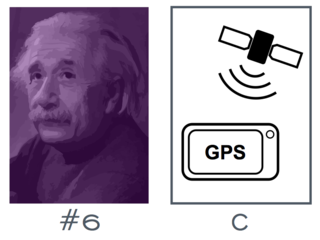Albert Einstein

The central tenet of Albert Einstein’s famous theory of relativity is that the speed of light does not depend on the state of motion of its observer, in stark contrast to, e.g., the speed of sound. Relativity diverges from Newtonian mechanics when objects move at very high speed or when extremely large masses are involved, such as the mass of planets or stars. It may thus seem unlikely that relativity plays any role in our everyday life, however, GPS is an example of a technology which requires an understanding of relativity. GPS receivers such as the ones your smart phone or sat nav device determine your position to within a couple of metres (special devices can even obtain centimetre precision). This works by a process called trilateration based on the arrival times of clock signals received from several satellites. Given the positions of the satellites, the differences in arrival time then uniquely pinpoint the location of the receiver. However, the extremely accurate atomic clocks on the satellites tick differently from a clock on Earth’s surface. This is both due to their high velocities of about 14,000 km/h as well as having a different view of Earth’s gravitational potential, being roughly 20,000 km above the ground. Both these relativistic effects need to be taken into account to make GPS work accurately. Interestingly, Albert Einstein won his Nobel Prize not for the theory of relativity but primarily for his work on the photoelectric effect, which was the first step towards the second big revolution in physics in the 20th century: quantum mechanics.
Want to learn more?
All our Physics degrees at Heriot-Watt teach the theory of relativity (3rd year course B29DR1 Dynamics and Relativity) and quantum theory (3rd year course B29QS2 Quantum Theory and Spectroscopy and 4th year course B20QD1 Quantum Theory and Solid Sate).
Heriot-Watt’s Institute of Photonics and Quantum Sciences represents Scotland’s largest research effort on quantum physics and upcoming quantum technologies.
At Heriot-Watt, some of our research links relativity and astrophysics with quantum mechanics: Prof Faccio’s Extreme Light group uses quantum optics to explore the phenomena predicted by the theory of relativity whilst Prof Thomson’s research is concerned with using quantum optics approach for building the next generation of astrophysical instruments, which may help us to learn more about exoplanets and the prospects of alien life.